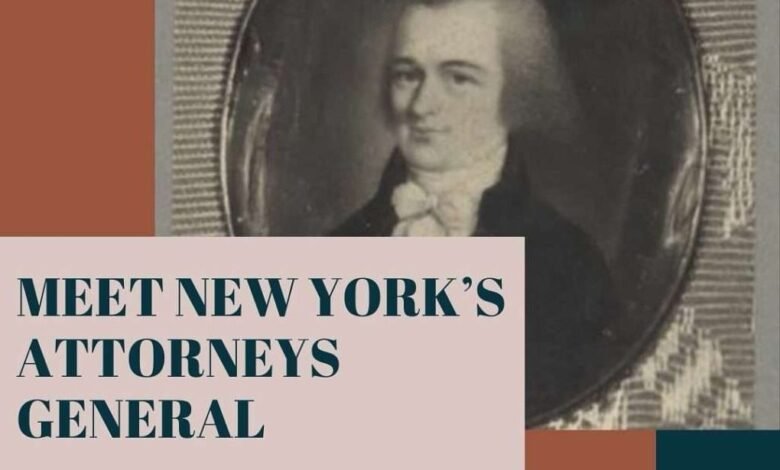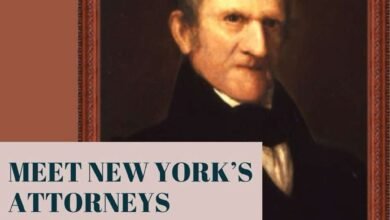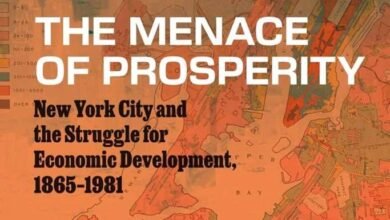NY’s Sixth Attorney General Josiah Ogden Hoffman


 Born on April 14, 1766, in Newark, New Jersey, Josiah Ogden Hoffman was destined for a life that intertwined law, politics, and a significant legacy.
Born on April 14, 1766, in Newark, New Jersey, Josiah Ogden Hoffman was destined for a life that intertwined law, politics, and a significant legacy.
After receiving his legal education in his uncle’s law office, Hoffman rose to prominence as a skilled litigator, often crossing paths with notable figures like Alexander Hamilton and steamboat pioneer and one-time Chancellor of New York James Kent.
His political career took off when he was elected to the New York State Assembly, where he served multiple terms during the early 1790s. However, it was his tenure as Attorney General from 1795 to 1802 that truly marked his impact.
At the insistence of Hamilton, he took on high-profile cases, including the important prosecution of People v. Frothingham, which showcased his commitment to justice and legal integrity.
People v. Frothingham, 1779
On November 6, 1799, the leading New York anti-Federalist newspaper, the Argus of Brooklyn, published an extract from a letter that had previously been printed in the Boston newspaper the Constitutional Telegraph.
It insinuated that Alexander Hamilton had tried to suppress a newspaper, the Philadelphia Aurora, by attempting to purchase it with money received secretly from an emissary of the British King George III.
Immediately, Hamilton wrote to New York Attorney General Josiah Hoffman insisting that David Frothingham, printer of the Argus, be prosecuted. On November 21, 1779, Frothingham was indicted on a charge of common law criminal libel.

 The case was heard before Supreme Court Justice Jacob Radcliff, Recorder Richard Harrison and Mayor David Mathews on November 25, 1799. Attorney General Hoffman was counsel for the prosecution and Brockholst Livingston represented the defendant.
The case was heard before Supreme Court Justice Jacob Radcliff, Recorder Richard Harrison and Mayor David Mathews on November 25, 1799. Attorney General Hoffman was counsel for the prosecution and Brockholst Livingston represented the defendant.
Under the law in effect at that time, anyone who published a writing, a printing, or even a picture that exposed another to “hatred, contempt or ridicule” was guilty of the offense of seditious libel. The truth of the published statement was irrelevant.
Brockholst Livingston, arguing for the defense, maintained that a Mrs. Greenleaf, the owner of the paper, was the person who should have been prosecuted for the libel and not her journeyman, Frothingham. Livingston also asserted that the statement was not libelous.
Hoffman replied that every journeyman and apprentice in the printing-office was liable to a prosecution and that Frothingham, as foreman of the office, was especially so. Livingston responded that this doctrine oppressed both the freedom of the press and the rights of labor.
Justice Radcliff instructed the jury that, according to that law, the jury should decide whether the article was calculated to expose General Hamilton to the hatred and contempt of his fellow-citizens; and if it was, whether the defendant had published it.
The jury returned a guilty verdict but recommended Frothingham to the mercy of the court. He was fined $100, and sentenced to four months in prison.
Later Life
A longtime friend of Alexander Hamilton and Washington Iriving (1783–1859), Hoffman was a pallbearer at Hamilton’s funeral after he was killed in a duel with Aaron Burr in 1804.
Hoffman’s daughter Sarah Matilda Hoffman (1791–1809) was engaged to Washington Irving, who had studied law at Hoffman’s office, but died before their wedding.
In addition to serving as Attorney General, Hoffman was the Recorder of the city of New York from 1808 to 1815 and later became one of the first justices of the newly established New York City Superior Court in 1828.
His influence extended beyond the courtroom; he was also an entrepreneur, forming a corporation to exploit a steamboat monopoly with Cadwallader Colden.
Hoffman’s life was as rich as the legal battles he fought. He married twice, first to Mary Colden, with whom he had several children, and later to Maria Fenno, daughter of John Fenno (1751–1798), the Federalist editor of the Gazette of the United States. They had three children, including the poet Charles Fenno Hoffman (1806–1884).
His descendants continued his political and judicial legacies, with his son Ogden Hoffman (1794–1856) serving in Congress and his grandson Ogden Hoffman, Jr. (1822–1891) becoming a federal judge.
Josiah Ogden Hoffman passed away on January 24, 1837, in the city of New York, leaving behind a formidable legacy. His contributions as a lawyer, legislator, and public servant continue to resonate today, reminding us of the foundations upon which our legal system stands.
This essay is one of a series by the Historical Society of the New York Courts on the history of New York’s Attorneys General. You can read them all here.
The Historical Society of the New York Courts brings together judges and lawyers to preserve, protect, and promote the legal history of New York — how it works to promote democracy, ensure justice, and promote the rule of law. Learn more about the Society and support their efforts by becoming a member or donating here.
Illustrations, from above: Josiah Ogden Hoffman, ca. 1790 portrait miniature by John Ramage (from Frick Photoarchive); and a Josiah Ogden Hoffman portrait by Gilbert Stuart, 1775.
Source link




